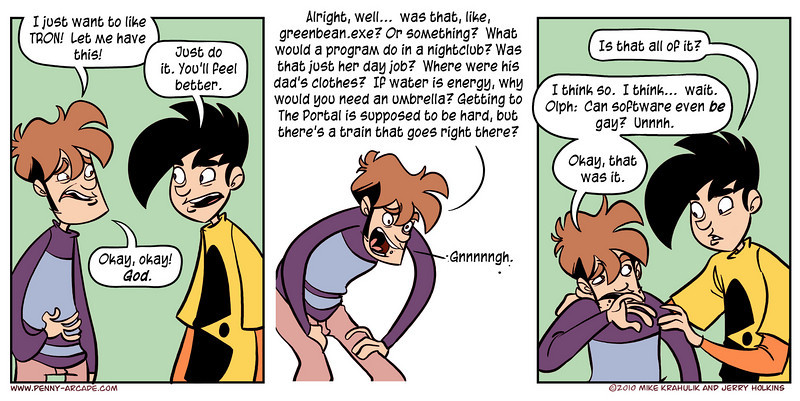Spoiler Alert:
More from the Penny Arcade guys:

Other thoughts I had:
-
If Encom had computers 20+ years ago that were capable of "digitizing" atomic structures, why was this technology not more prevalent in current day? Why was Encom just a generic Microsoft-esque corporation with its shoddy operating system as its only apparent product? It's not like the company's intellectual capital disappeared with Flynn. Same goes for Encom's patents on hardware technology capable of storing the complexity of atomic structures digitally. If that kind of technology was available 20+ years ago, why would the computers they depicted in the real world represent anything we have today?
-
Flynn wasn't really the creator of the Tron universe, at least the first one. He was a user, and while he was definitely a user with a better understanding of the system than anyone else, he was still just some guy who got laid off because he was caught hacking Encom's existing system. He only knew about the games he'd played in the arcade before he entered the Tron world, everything else was foreign to him (his interactions with the programs, the electricity-as-water, how to steer the recognizer, his powers as a user, etc.) As for being the creator of the second Tron universe, his mistake in getting trapped in the system only speaks to his unfamiliarity with the system. Why he was depicted as a somewhat-deity with special powers when he was just a user for the system he had been playing with... I just don't know.
-
Let's assume the writers meant anything when they had the first lines as "The Grid. A digital frontier. I tried to picture clusters of information as they traveled through the computer. Ships, motorcycles. With the circuits like freeways. I kept dreaming of a world I thought I'd never see." I interpret that to mean that Flynn (or somebody) wrote the second Tron universe to be both the simulation of the Tron universe and the interface to the Tron universe. That is, the programmer wanted to show the world the workings of a computer in terms of real-world physical analogs: streets, ships, motorcycles, etc. But... who in the hell would want to see that? The workings of computers are boring as hell to 99.9% of the population. Flynn's motivation, aside from the digitization technology, for showing the world his creation, is questionable.
-
As stated in the film, Clu could not create programs, only kill or repurpose them. Why then, after 20 years, were there any programs left to repurpose at the end? Why hadn't Clu repurposed his armies to search, by foot if they needed to, for Flynn's hideout?
Gah. The more I think about this film, the more I just fed up with its frayed ends.